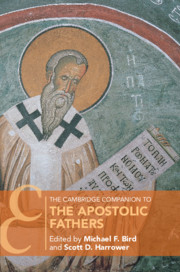Book contents
- The Cambridge Companion to the Apostolic Fathers
- Cambridge Companions to Religion
- The Cambridge Companion to the Apostolic Fathers
- Copyright page
- Contents
- Contributors
- Abbreviations
- Introduction Intriguing and Enigmatic
- 1 The Roman Empire in the Era of the Apostolic Fathers
- 2 The Image of Jews and Judaism in the Apostolic Fathers
- 3 Second-Century Diversity
- 4 The Jesus Tradition in the Apostolic Fathers
- 5 The Text of the New Testament in the Apostolic Fathers
- 6 The Reception of Paul, Peter, and James in the Apostolic Fathers
- 7 Between Ekklēsia and State
- 8 Church, Church Ministry, and Church Order
- 9 The Apostolic Mothers
- 10 1 and 2 Clement
- 11 The Letters of Ignatius
- 12 Polycarp’s Epistle to the Philippians and the Martyrdom of Polycarp
- 13 Didache
- 14 The Epistle of Barnabas
- 15 The Shepherd of Hermas as Early Christian Apocalypse
- 16 The Epistle to Diognetus and the Fragment of Quadratus
- 17 The Fragments of Papias
- Sources Index
- Subject Index
- Cambridge Companions to Religion (continued from page )
- References
13 - Didache
Published online by Cambridge University Press: 28 May 2021
- The Cambridge Companion to the Apostolic Fathers
- Cambridge Companions to Religion
- The Cambridge Companion to the Apostolic Fathers
- Copyright page
- Contents
- Contributors
- Abbreviations
- Introduction Intriguing and Enigmatic
- 1 The Roman Empire in the Era of the Apostolic Fathers
- 2 The Image of Jews and Judaism in the Apostolic Fathers
- 3 Second-Century Diversity
- 4 The Jesus Tradition in the Apostolic Fathers
- 5 The Text of the New Testament in the Apostolic Fathers
- 6 The Reception of Paul, Peter, and James in the Apostolic Fathers
- 7 Between Ekklēsia and State
- 8 Church, Church Ministry, and Church Order
- 9 The Apostolic Mothers
- 10 1 and 2 Clement
- 11 The Letters of Ignatius
- 12 Polycarp’s Epistle to the Philippians and the Martyrdom of Polycarp
- 13 Didache
- 14 The Epistle of Barnabas
- 15 The Shepherd of Hermas as Early Christian Apocalypse
- 16 The Epistle to Diognetus and the Fragment of Quadratus
- 17 The Fragments of Papias
- Sources Index
- Subject Index
- Cambridge Companions to Religion (continued from page )
- References
Summary
Several patristic authors witness to a tradition of ancient instruction frequently identified as “Teaching of Apostles” (didache apostolōn). While the precise nature of that corpus stayed hidden to scholars for centuries, clearly its contents were considered important in various regions of the early Christian Mediterranean world. This renown is demonstrated, for example, by the fourth-century Alexandrian bishop Athanasius, who observed in his annual letter declaring the time for Easter observance in 367 CE that “Teaching of the Apostles” (didache tōn apostolōn) was accepted in his diocese, though he omitted it from any “canon” of works thought worthy for liturgy. What could be identified about the features of the tradition remained vague from patristic sources generally, however, clarified only in part during the ninth century when Patriarch Nicephorus of Constantinople described the length of the text in his Stichometry as 200 “lines” (stichoi). Beyond this, little was known of the tradition prior to 1873, at which time Metropolitan Philotheos Bryennios of Nicomedia came upon a version of the text within Codex Hierosolymitanus 54 (= H), stored at the Jerusalem Monastery of the Holy Sepulcher in Constantinople (modern Istanbul). That codex, dated by inscription to June 11, 1056, contains a tractate bearing two distinct titles: a brief heading “Teaching of the Twelve Apostles” (didache tōn dōdeka apostolōn) and a longer one at the beginning of the opening line, “Teaching of the Lord through the Twelve Apostles to the Nations” (didache kuriou dia tōn dōdeka apostolōn tois ethnesin). While neither header was necessarily original to the tradition – the shorter title having possibly served as an incipit based on the longer form – such markers indicate this manuscript represents some form of the ancient Christian tradition of teaching now known by early church historians as the “Didache” (didache).
- Type
- Chapter
- Information
- The Cambridge Companion to the Apostolic Fathers , pp. 248 - 267Publisher: Cambridge University PressPrint publication year: 2021



